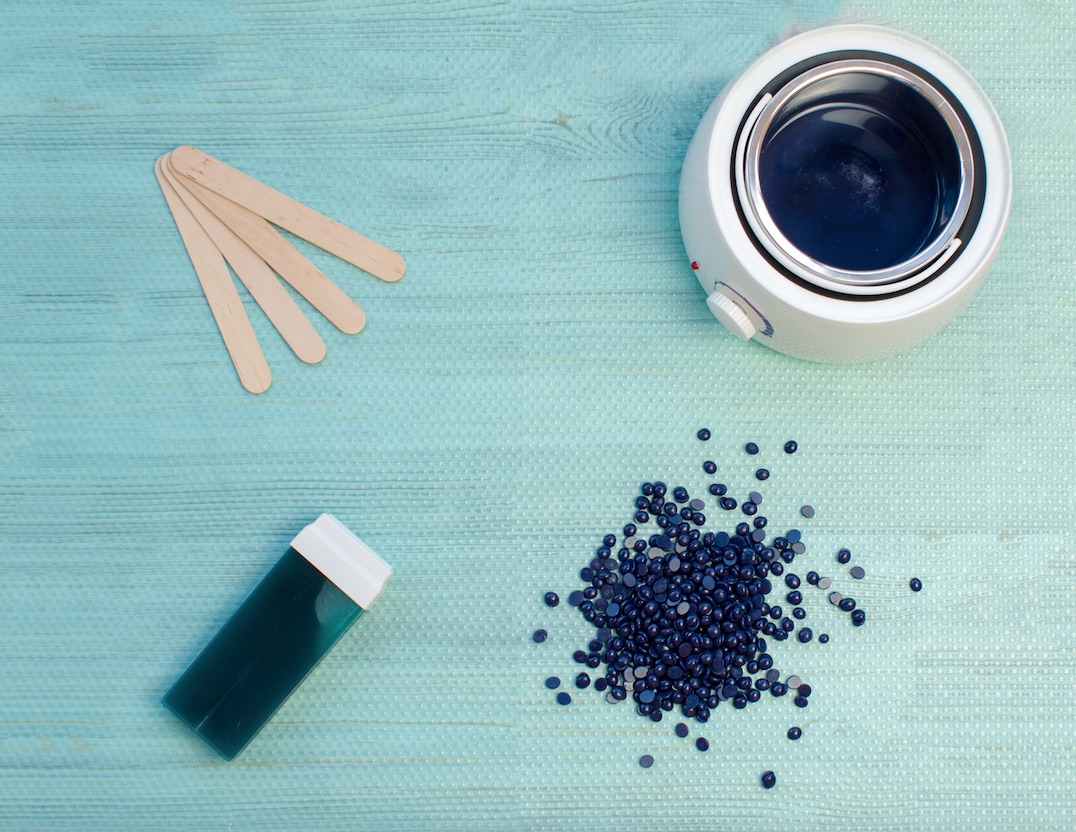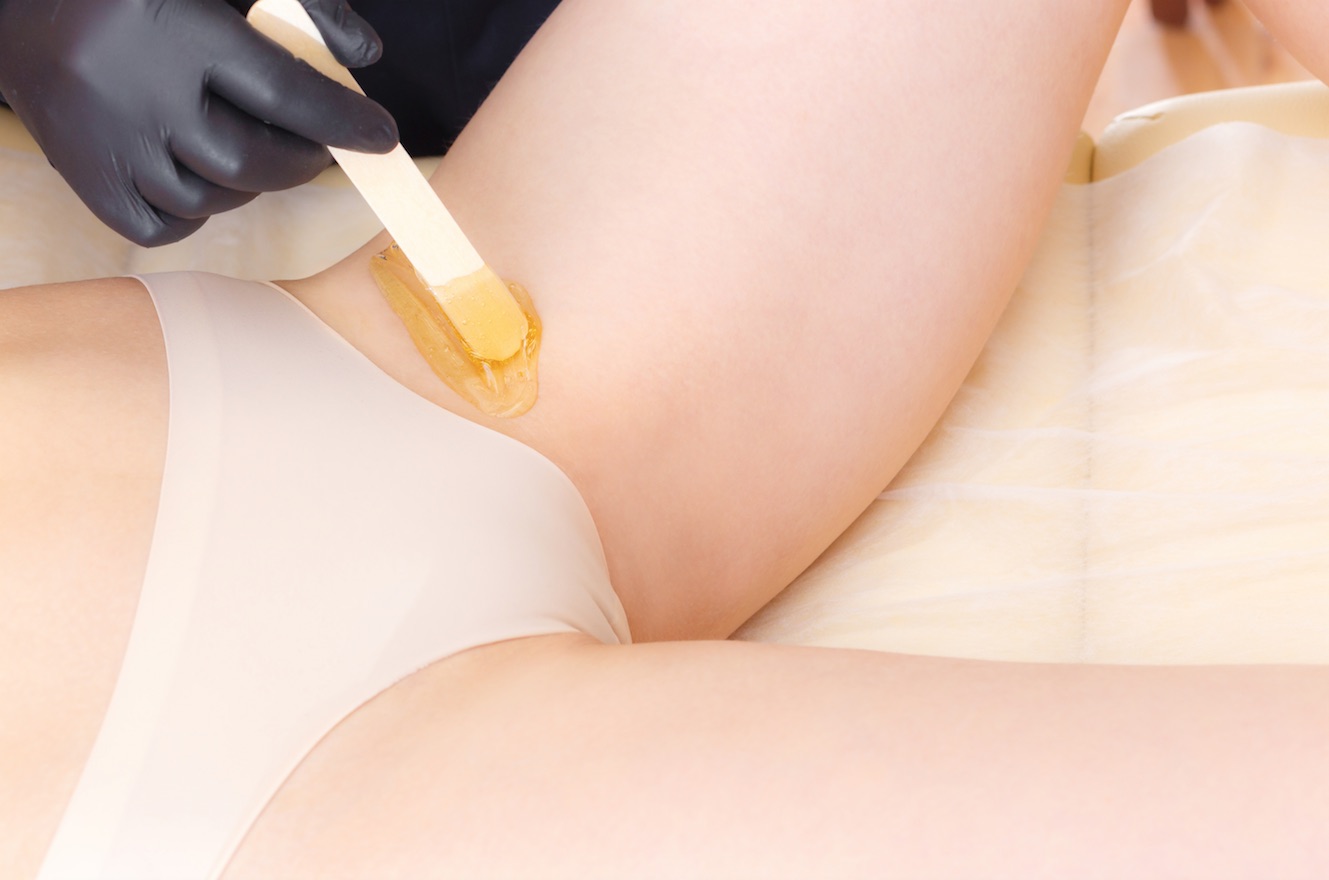We spoke with some of the industry's leading waxers about everything you need to know before offering intimate waxing in your salon.
1. Do your research
Andy Rouillard, owner and manager of male grooming salon Axiom Bodyworks in Basingstoke, says: “This is not a job for the fainthearted. You need good communication skills, an eye for detail, and a certain amount of fearlessness to be a successful waxer. A healthy sense of humour also comes in handy.
"If you can’t imagine getting hands-on with a customer’s naked bits then this probably isn’t the treatment for you and that’s fine. Despite its popularity, no therapist should ever feel under pressure to offer intimate waxing if they’re anxious or feel uncomfortable about doing so.”
2. Carry out a thorough consultation
“Make sure you carry out a thorough consultation with your client before their treatment. It is really important to know if your client is pregnant, is on any medication, or has any health concerns,” explains Joanna Weller, beauty therapy tutor and assessor.
“With returning waxing clients, go through the consultation and just ask if they have had any changes since their last visit. The more information you have, the better the treatment you can deliver.”
3. Make the options clear
“Whether it's a basic bikini line or a full Brazilian wax, make sure your website lists all the options with a full description of what's included,” says Jack Dunn, The Wax Coach.
“What's really good for male clients is to give your intimate waxing treatments their own unique code or name, then clients can easily call up to book in for the 'Essex Road' without the fear of their colleagues or friends overhearing the conversation.”
4. Remember, male and female intimate waxing are totally different
Louise Wendt de Oliveira, beauty tutor at Derby College and former waxing salon training manager, explains: “Lack of certification means that there are therapists who are not insured to carry out intimate waxing on clients, which is a big deal. Even if you’re self-taught and you feel like you know what you’re doing, you still need an intimate waxing qualification to add to your insurance.
“Also, just because you may be properly taught and certified in female intimate waxing, that doesn’t mean you’re properly equipped, qualified or insured to carry out the even more delicate art of male intimate waxing.
"Male intimate waxing is a separate qualification and certification altogether, which you need for your own benefit, the benefit of your male clients, and to comply with your insurance terms.”
5. Monitor the wax temperature
This is extremely important, as Marta Zaczkowska, owner of the Waxing Specialist Academy in London and the Zaka Wax brand, explains. “Be careful and always double check the temperature throughout the treatment – in the beginning, middle and when you’re finishing. When you’re doing the last bits, the skin has been more exposed from when you first started, so you don’t want to burn your client.
“You could accidentally turn the thermostat on the waxing pod and then your client might have some areas that are more sensitive, which means that when you’re reapplying the wax it will feel hotter than before.”
Some waxing pods have an electronic temperature sensor and display, but Zaczkowska suggests checking a few other things too. “One way I know the wax is too hot is by the smell, while the other sign is the texture. If it's too runny, then I know it will be too hot for the client to handle. I test this by seeing how quickly the wax drips from the spatula,” she adds.

6. Be clever with your waxing technique
Be mindful about the way in which you remove the wax to make the process as comfortable as possible. “Don’t pick the end of your peelable wax off the skin. In many cases, the flicking of the end of the wax with your fingernails is more painful than the actual removal,” says Tracey Smith, founder of wax brand Ashmira Botanica.
“Instead, daisy chain your wax using the previous strip or dip your spatula into the end of the wax using the waxy end as these lift it painlessly. If you have a good, smooth end to your wax, it should roll away from the skin when you stretch it.”
7. You need to be adaptable
Adapting the treatment to suit your client is so important. “For example, if your client is pregnant then they may feel more sensitive to the heat of the wax and also find the treatment a little more uncomfortable,” advises Wendt de Oliveira.
“This can be resolved by using the correct pre-waxing solution and barrier oil to protect the skin, and just by taking a little more time, applying smaller wax strips. Your pregnant clients won't be able to get into certain positions either, so make sure you're able to adapt your treatment so you can still perform a full intimate wax without them being uncomfortable.
“For example, your pregnant client could roll onto their side rather than bringing their knees to their chest when waxing around the buttock area. The client may also feel more comfortable stretching the areas themself, especially around the lower abdomen area.”
8. Be aware of contraindications to waxing
“In addition to the standard waxing contraindications, Habia recommends that therapists should be checking for STIs and urinary tract infections,” says Rouillard.
“Debate continues within the industry as to the actual risk of cross-infection when waxing and it’s worth remembering that clients might not even be aware they have an infection because many STIs do not present with recognisable symptoms for several months after exposure.
"To protect ourselves and our clients, it’s vital therapists follow universal hygiene procedures for intimate waxing – wear gloves, don’t double-dip, disinfect and sterilise tools and equipment as appropriate, use clean towels, and dispose of salon waste in line with your local authority guidelines.”
9. Be confident in treatment
“When waxing hard-to-reach areas, the correct positioning and stretching of the client is imperative for a thorough wax. You can’t be embarrassed to ask a client to get into different positions to reach those hard to see areas,” says Lisa Stone, Salon System educator and wax specialist.
Explanation is key here as well, adds Weller: “Explain what you’re doing and why you’re doing it. Similarly, explain to the client what products you’re using and why you’re using them.
“This information will instil confidence into your client that you’re a professional in your field and will also help with retail sales if you’re using a range that can be purchased by the customer too.”
10. Triple check that no hairs are left behind
It’s important to not leave any hairs behind as the client will be looking for a perfect finish. “At the beginning of the treatment, assess the area to decide whether the hairs are the right length. If they’re too short then you can’t provide a good level of service, so reschedule the client to a more suitable time,” explains Zaczkowska.
“If you force the treatment, then you most likely won’t give your client a good result and they will leaving thinking that you are not a good waxer.” Also, be thorough at the end of the treatment.
“If you can, repeat the section, then you can remove remaining hairs with tweezers. Sometimes simply changing the lighting or the angle of the area you’re looking at can help you to have a good look and spot any tiny hairs remaining,” she adds.

11. Always consider ways to bring in new wax clients
Many people go to a lot of effort adoring their bodies with tattoos and piercings, so they probably don’t want hair growing over and covering them.
If you know someone’s going to get a sleeve tattoo, then offer to wax them beforehand. This becomes a great opportunity to link up with the local tattoo parlour, who usually do body piercings too.
12. Make sure therapists feel comfortable doing an intimate wax
“You have to think about the happiness and willingness of your staff team when offering services,” says Rouillard. “Some won’t want to offer intimate waxing to men because of religious reasons, or maybe their partner isn’t comfortable with it, for example.”
He adds: “They have to want to do it. There’s nothing worse than trusting your bits and bobs in the hands of a nervous therapist, let’s be honest.”
13. Don’t forget waxing aftercare
This is crucial when coming to the end of your treatment. “Your care doesn't stop when the pain does, so offer your client the best aftercare advice. Avoid flyers and paper handouts – we have a board in salon that they can take a photo of that has all of our aftercare advice on,” advises Amy Lewis, director of the Mooeys Group.
“Clients want to know about products that will help them care for their skin at home until their next wax, so make sure you let them know what is available and how to maintain their results, as well as prevent any possible problems.”
14. Invest in regular training
“Having advanced knowledge makes you the expert to go to. Clients will choose you based on your knowledge and the investment you have made to master your skills. You can also charge a premium price if you are the local expert in waxing,” says Lewis.
“So, invest in pregnancy waxing and knowing how to deal with clients going through fertility treatment or the menopause as it's all really important stuff.”
Your training should also cover all aspects of waxing treatments too, so you’re fully prepared. “Knowing what could go wrong is just as important as getting it right. When you look to investing in training, make sure you’re going to learn about how to deal with difficult circumstances, reactions, and possible outcomes,” she adds.




